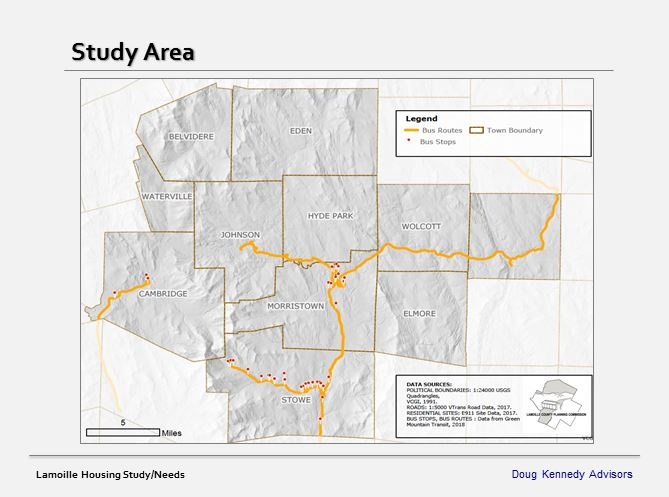2018 Housing Study & Needs Assessment:
Lamoille County & Hardwick
Do you understand affordable housing in your community? What signs indicate need? What factors determine project development? Affordable housing is a nuanced issue that requires consideration of many aspects to give scope to it.
In 2018, LHP, the Lamoille County Planning Commission and Stowe Land Trust partnered with Doug Kennedy Advisors to survey our service area to produce a report that illustrates the overall need in Lamoille County & Hardwick, assessing the aspects below:
The economy - major regional trends
Characteristics of supply - housing stock
Financial characteristics - housing
Housing - market trends
Demographics - household characteristics & demand
Perspectives on supply & demand - key study area towns and employers
Analysis - demand & supply
Finds & recommendations
January 29th, 2019 | Housing Needs Summit | Recap
On January 29th, Lamoille Housing Partnership (LHP,) Lamoille County Planning Commission (LCPC,) and Stowe Land Trust (SLT) hosted the Housing Needs Summit that featured a data report of the Lamoille Valley’s housing landscape, and a panelist discussion that identified opportunities and challenges to address the region’s housing needs.
““This is such a complicated issue that will not be solved without engaging the whole community. LHP, LCPC, and SLT wanted to come away from the Summit with some ideas to address the pressing issues around the lack of good housing in the area, such as homelessness, the growing gap between household incomes and increasing rental costs, and the cost of new home construction. Having a panel of diverse leaders from across the community was a great way to spark conversations among participants.””
Lamoille County & Hardwick: Housing Data
A comprehensive data presentation by Doug Kennedy Advisors showed that the study area, Lamoille County and Hardwick, have a shortage of housing. Kennedy authored the “Lamoille Housing Study & Needs Assessment” report published for LHP, LCPC and SLT in 2018.
Several key variables that were pinpointed illustrate the study area’s housing crunch:
Housing stock
Housing availability
Vacancy rates
Incomes and wages
The nuances of the data give scope to some deeper factors that influence and affect the study area’s housing landscape, such as the discrepancy between housing need and availability, the area’s ratio of housing stock and type as it relates to demographics and incomes, income inequality between communities, area demographics that reflect the housing stock needed, as well as projections for the future based on current study data. Significant additional factors include the study area’s population growth, demand for market-rate rentals that show profitability-potential in new development, and increasing demand for senior housing across all income brackets.
Panel Discussion: Housing Opportunities & Challenges
A robust panelist discussion followed Kennedy’s data presentation, comprised of nine professionals within business, education, healthcare, real estate, development, human service and affordable housing development sectors, as well as representatives from municipalities and State government.
Panelists, L to R: Tom Jackman, Will Eberle, McKee Macdonald, Martin Hahn, Mark Frier, Jen Hulse, Heidi Scheuermann. Not pictured: Graham Mink, Ceili Quigley.
Panelists included:
Ceili Quigley, MSW | Community Health Team Social Worker, Community Health Services of Lamoille Valley (Stowe Family Practice)
Graham Mink | Green Mountain Management
Heidi Scheuermann | Vermont State Representative, Lamoille -1
Jen Hulse | Director of Student Support Services, Lamoille North Supervisory Union
Mark Frier | Co-owner, The Bench, Tres Amigos, and The Reservoir restaurants
Martin Hahn | Housing Director, Vermont Housing & Conservation Board
McKee Macdonald | 2018 President Lamoille Area Board of Realtors, Coldwell Banker Carlson Real Estate
Tom Jackman | Director of Planning, Town of Stowe
Will Eberle | Field Director, Vermont Agency of Human Services
Top 4 Opportunities
Strong partnerships between public and private entities
Community-based investments in programs to prevent evictions and homelessness
Increased funding of federal and state subsidies to make housing price points affordable
Renter-centric support systems to connect housing insecure residents with resources to achieve housing affordability
Top 4 Challenges Many challenges mentioned were directly connected to windows for opportunity; however, additional housing challenges that were identified…
Exclusionary zoning practices that eliminate housing development for specific populations
Out of sync federal housing and economic policies
Low availability of subsidies and development tax credits
Continuously rising development costs
Watch the Housing Needs Summit
Next steps:
May 1st, 2019 | Housing Solutions Summit: Collaborative Workshop | Recap
Lamoille Housing Partnership (LHP) and the Lamoille County Planning Commission (LCPC) hosted the Housing Solutions Summit as a follow up to the Housing Needs Summit. The discussion-based forum gathered local community leaders, decision makers and members of the public to discuss and propose locally focused, collaborative, actionable solutions to the Lamoille region’s housing opportunities and challenges.
““In response to the outcomes and feedback of the previous Housing Needs Summit, LHP and LCPC felt the next step was to reconvene (previous Summit) attendees and members of the public to facilitate discussions critical to addressing Lamoille communities’ diverse housing needs.” ”
Collaborative solutions: group highlighted priorities
LHP’s and LCPC’s shared goal of the Housing Solution Summit was to address some of the key points of discussion from panelists at the previous Housing Needs Summit, held in January. Professionals from human service agencies, Vermont state government, local municipalities, health care, education, as well as local developers and landlords participated in round table discussions to brainstorm and focus on what can be done locally.
Groups participate in round table discussions to address and propose solutions to the housing challenges and opportunities identified at the previous Housing Needs Summit.
Attendees were tasked to discuss 4 topics in 20 minute cycles, including:
Improve housing stock
Reduce development costs
Reduce homelessness and evictions
Address the lack of housing in the Lamoille region
Breakdown: questions and proposed solutions
The “Lamoille Housing Needs & Assessment Study” identified that the Lamoille Valley has old and inefficient housing stock, a real lack of affordable rental housing, and a need for new housing for homeownership opportunities. What can we do to incentivize improving existing housing stock, development of rental housing, and providing more opportunities for homeownership?
Home sharing
Incentivizing or requiring renovation of sub-standard housing stock
Tiny home construction
Improving energy efficiency
There was agreement among many of the Housing Needs Summit panelists that the high costs of development and construction are holding back new housing stock. What can be done locally to address these issues?
Revitalization of downtowns
Adjust Act 250 and local zoning ordinances
Adjust permitting processes to meet pressing community needs on a faster timeline
Besides needing more rental housing across many parts of Lamoille communities, rising eviction rates and homelessness places a burden on local landlords and service providers alike. What can we do to address the underlying issues in order to reduce rising eviction rates and homelessness in our area?
Landlord and tenant assistance
Supportive housing and alignment of regional services
Education at the municipal level to inform and facilitate resource connections and awareness, reduce NIMBY-ism and the stigma of homelessness, and develop more emergency housing options.
The lack of housing addressed in the study was backed up by the panel as a whole, ranging from no local homeless shelter, a lack of employee housing holding back business development, not enough senior housing to address the greying of Vermont, and young people not being upwardly mobile through homeownership. Are there public, municipal and private partnerships that can be developed to address these areas of housing needs in our communities?
Developing partnerships with housing development organizations including Lamoille Housing Partnership, USDA Rural Development and Habitat for Humanity, education centers, Agency of Human services and local human service organizations, financial and fuel assistance organizations, and for profit businesses
““Housing is a basic need, a right… We are all interested in a mindful approach to development of our land, and to serve our diverse population thoughtfully.””
Next steps: LHP has applied for grant funding to fund some of the collaborative solutions brought to the Housing Solutions Summit by attendees… stay tuned for more information as this unfolds.














